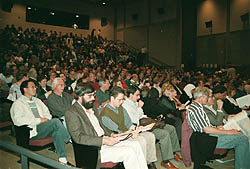
December 3, 1999
Senate narrowly postpones vote on narrative evaluations
By Jim Burns
By a razor-thin margin on Friday, UC Santa Cruz's Academic Senate postponed a vote
on the campus's Narrative Evaluation System at a meeting that attracted approximately
1,000 student supporters of the long-standing practice.
 |
| Faculty members, staff, and students packed the Media Theater
to listen to the debate on the Narrative Evaluation System.
(more photos) Photos: Karin Wanless |
Anderson's vote provided a stunning conclusion to Friday's meeting. But senators on both sides of the issue said the debate will resume in the winter quarter. In fact, George Brown, CEP chair, urged his colleagues to give his committee a chance to continue assessing the 35-year-old staple of UCSC's grading system. He said a report on their work, begun earlier this quarter, could be forthcoming at the February 23 meeting of the senate and "detailed legislation" could be ready for consideration at the spring session.
Friday's special meeting of the senate was prompted by a petition signed by more
than 170 members of the senate who recommended that the campus's Narrative Evaluation
System be replaced by the conventional UC grading system.
Not all of the signers expected the matter to become the subject of an end-of-quarter
special meeting, however. Former senate chair Helene Moglen said she had signed the
petition but hadn't intended for a decision on NES to be rendered "hastily."
Several speakers echoed that theme, emphasizing that the matter deserves more consideration
before the evaluation system is significantly changed or abolished.
Others were inclined to vote for the anti-NES resolution on Friday. They argued that faculty could continue the discussion in smaller circles during the approximately two months it would take to circulate and tabulate a mail ballot.
Such a ballot, which can be requested by as few as 25 faculty, is considered a near certainty in any important matter in which the vote is close at a senate meeting. Anderson said Friday's vote could also be challenged by a mail ballot, but the outcome of such a vote wouldn't significantly affect the timing of the next NES debate before the full senate; either way, the senate is expected to take up the matter again in February.
Professor of biology Lincoln Taiz opened the anti-NES argument on Friday. The system, approved for UCSC's first year in 1965-66, was appropriate for the campus when it was a "small, liberal arts college," he said. But does the grading system work for a campus with 11,000 students that is projected to grow? Taiz asked. "For many of the faculty here today, the answer is a resounding 'no,'" he said.
Students saw the matter quite differently. Student Union Assembly chair Kirti Srivastava said the undergraduate body had collected signatures from nearly 4,400 students in three days who "stand firm and united against this proposal and demand that a vote not be taken today."
The members of UCSC's Alumni Council, the governing board for the Alumni Association, also weighed in, calling the proposal to do away with the NES a "rush to judgement."
"We fail to understand why this proposal should not go through a formal, consultative, deliberate process that can give it the scrutiny it warrants," the association said in a letter read by alumnus John Wilkes, director of UCSC's Science Communication Program.
The resolution before the senate on Friday called for UCSC to implement the following features of the University of California's grading system:
- Grades A-F, including plus and minus suffixes for grades A-D.
- An option for students to take up to one-third of total course units on a Pass/No
Pass basis.
- An option for departments to require that courses applied toward credit in a
major be taken on a letter-grade basis.
- Grade points per unit, assigned as A=4, B=3, C=2, D=1, F=0. Minus grades would be assigned three-tenths grade point less per unit than unsuffixed grades; plus grades (except A+) would be assigned three-tenths grade point per unit.
In a last-minute amendment to the resolution, supporters of the resolution added language that would have enabled faculty to opt to provide narratives in certain classes.
The changes outlined in the resolution would have taken effect on September 1, 2001.
The meeting on Friday marks the third time this decade that UCSC's long-standing Narrative Evaluation System (NES) has been the subject of an Academic Senate debate. In an informational action intended to guide NES deliberations by the senate's Committee on Educational Policy, senate members participated in a spirited debate in June 1993 before voting to maintain NES.
In the fall of 1996, however, senate members voted by a two-to-one margin to permit new and continuing students to request letter grades for all classes, beginning in fall 1997. The change retained the NES, but enabled new students to accumulate a grade-point average. During this past academic year, approximately one-third of UCSC's students requested grades.